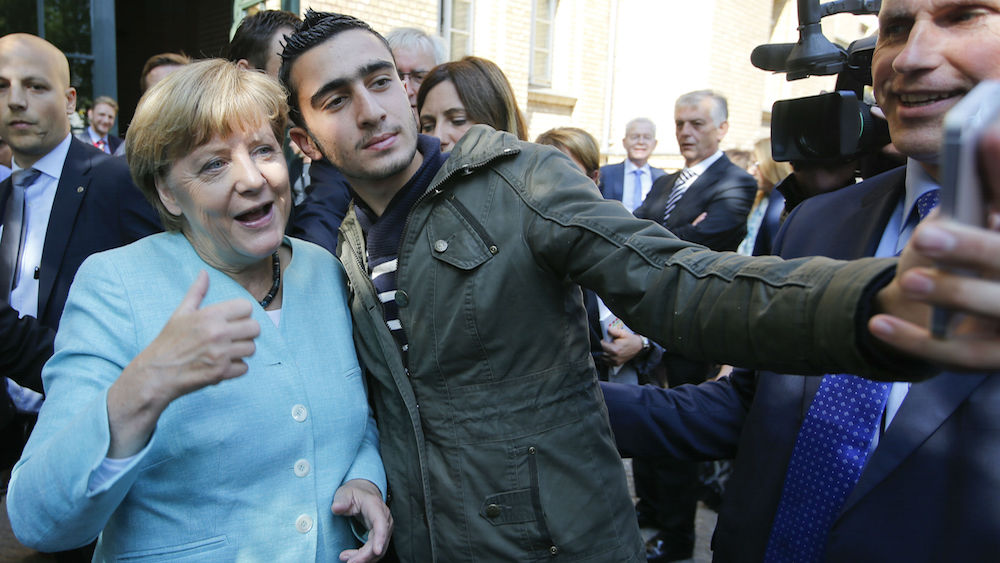In early September, Angela Merkel took a momentous decision: the German chancellor opened her country’s borders to hundreds of thousands of refugees seeking shelter from conflicts in the Mideast and elsewhere. Many Germans still believe Merkel was right, but doubts are growing, and her party is becoming nervous. Could her job be at stake?
Only yesterday Angela Merkel seemed destined to rule forever. Her lead over every other politician in Germany was so crushing that nobody even wanted to try and run against her in the 2017 elections, and within her own party Merkel’s dominance was absolute, with every potential rival side-lined years ago.
How quickly things change! Over the past few days, German media ranging from Die Zeit to Deutsche Welle and Cicero to the Berliner Zeitung have asked whether Merkel’s time in power is coming to a close. The national tabloid Bild ran a huge piece speculating that she might try and succeed Ban Ki-moon as UN Secretary General in 2017.
The reason for this sudden shift is Merkel’s policy on refugees. On September 5, faced with the fate of thousands of refugees who were stuck in terrible conditions in Hungary, she opened Germany’s borders. It was the chancellor’s personal decision; she took it without even consulting her cabinet, let alone the other EU governments.
Merkel’s decision effectively meant the end of the European Union’s Dublin II agreement, according to which the country where a refugee first enters the EU is responsible for dealing with his or her asylum request. It also negated any leverage Merkel might have had to make other EU countries take in shares of the refugees.
Within days of Merkel’s announcement, throngs of people from Syria, Afghanistan, Iraq, and elsewhere were crossing the border into Germany. The chaos became such that Merkel’s Interior Minister, Thomas de Maizère, decided to bring back border controls.
While many Germans have made huge efforts to welcome the refugees, it is increasingly becoming clear that the country is seriously overtaxed with registering and housing so many people.
In September alone, some 200,000 refugees arrived in Germany. To a growing number of worried Germans, Merkel’s confident approach to the influx (“We can manage this”) is beginning to sound hollow. And seeing refugees hold up pieces of paper that say “Thank you, Mama Merkel” does nothing to reassure her voters.
Opinion polls shows a deeply divided society. A survey published on October 1 shows that 51 percent of Germans say this huge wave of immigration scares them – up from 38 percent last month. At the same time, the chancellor’s personal popularity has sharply declined, and her party’s scores in the polls are also going down.
No wonder, then, that cracks are becoming visible in Merkel’s political base. The first conservative politician to attack the chancellor over the refugee crisis was Bavaria’s state premier, Horst Seehofer, who publicly criticized Merkel’s decision on September 5 as a “grave mistake”. Seehofer also made a great show of receiving Hungary’s right-wing Prime Minister Viktor Orbán – a persona non grata to most Europeans – and endorsing his severely restrictive policy on refugees.
Were Seehofer alone, his actions would not have caused much of a stir – in Bavaria, conservatives have always been more populist and quarrelsome than elsewhere in Germany. The situation became far more serious for Merkel when de Maizière, one of her closest and most loyal advisers, publicly blamed her decision for the loss of control over the situation. And this past weekend, German President Joachim Gauck added a warning not to overtax Germany’s capacities. “Our heart is big, but our possibilities are finite,” he said.
German media have described the refugee issue as the greatest challenge Germany has faced in decades, certainly greater than the Greek crisis and possibly as significant as September 11 or the fall of the Berlin Wall. The meaning of this is clear: should Merkel’s grand welcome to the refugees turn out to have been a mistake, the consequences might be important enough to justify her stepping down.
So is this for real? Whenever asked, Merkel herself says that she will serve the full term that she was elected for. This would mean that she would remain in office at least until 2017. Until very recently, it would have been unthinkable for her to go back on her word.
Yet Merkel keeps surprising us. She appears to have thrown caution to the wind as she stands up for human decency and defies populist reflexes, full of confidence that her country will master this challenge and emerge from it stronger. Perhaps it is true what Tina Hildebrandt and Bernd Ulrich of Die Zeit wrote: after ten years in office, Angela Merkel may have lost her fear of losing power.







